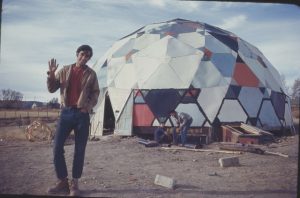Richard Kallweit
b. 1943

Richard Kallweit explores mathematical forms in his artworks, focusing on the arrangement of units in space. Drawing inspiration from scientific concepts such as cubic packing, fractals, tessellations, symmetry, and growth patterns, he develops these works over time, blending established mathematical principles with his own inventive ideas, forging a unique artistic vocabulary that often creates an organic emergence akin to natural phenomena. A central aim in his artistic process lies in achieving a sense of beauty, harmony, and completion, or intentional lack thereof. Kallweit’s artworks engage audiences in a contemplative journey where the underlying order and inherent beauty gradually unfold, revealing the carefully crafted interplay between mathematical concepts and artistic innovation.
Richard Kallweit is the co-founder Drop City, an artist’s community, 1965-69, during which time Kallweit became involved with the geometrical concepts of Buckminster Fuller and worked on collaborative kinetic paintings based on geometric principles and geometrical based architecture. Later the artist contributed to the first concepts for Zometool (a structural construction set still in production).
After leaving Drop City, Kallweit, along with Clark Richert, Charles DiJulio, George Woodman, and others, co-founded Criss Cross: an artist’s collaborative whose main focus was the interaction of the arts with math and scientific concepts. The group published a periodical as well as sponsored exhibitions and conferences primarily in Colorado.
“I use art related ideas to develop mathematical concepts and math-related ideas to influence my painting and sculpture. These include the use of particular chosen materials, close observation, long periods of contemplation, and a developed sense of play. I believe that the intuitive nature of art can lead to many unexpected discoveries. Structure, form, chance, fractals, tessellations, nuance and order all enter in” – Richard Kallweit


